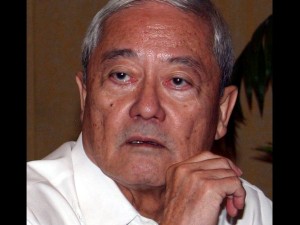Senate probing Ongpin for ‘short-swing profits’
MANILA, Philippines—From behest loans to insider trading to short-swing profits.
That is how far the Senate has expanded its investigation into businessman Roberto Ongpin who reportedly obtained a P660-million loan from the Development Bank of the Philippines (DBP) and used the money to buy the state bank’s Philex Mining Corp. (Philex) shares.
Sen. Sergio Osmeña III, chair of the Senate committee on banks, on Friday said his committee is looking into the possibility that Ongpin may have made about P2 billion in “short-swing profits” while sitting on the board of Philex three years ago.
Short-swing profits are profits earned within six months of a trade, including profits made from the sale of securities followed by their repurchase within six months.
Osmeña said Ongpin may have made the P2-billion profit within six months after he purchased the 50 million Philex shares of DBP using a second loan of P550 million from the state bank. (He made an earlier loan of P150 million.)
Return of profits sought
Ongpin is already the subject of a lawsuit by lawyer Mario Ongkiko, a Philex minority shareholder who is seeking the return of P412 million in “short-swing profits” that Ongpin allegedly made through his purchase of the DBP’s Philex shares.
Ongpin, who served as trade minister to the late dictator Ferdinand Marcos, sold in late 2009 the Philex shares he had bought from DBP, along with others he had accumulated, as a block to businessman Manuel V. Pangilinan, allowing the latter to gain control of Philex, the country’s largest gold and copper mining company.
“If you add all that up, we estimate his profits, his illegal short-swing profits to reach about P2 billion,” Osmeña told reporters after the committee hearing on Friday into the alleged “behest loan” of P660 million that Ongpin obtained from the DBP in 2009.
“But we will wait. I will not go officially on that. We will wait until we obtain records,” Osmeña said.
The senator said his committee was certain about the P412-million profits alleged in the Ongkiko suit, based on existing records.
“But we found out, digging through some SEC (Securities and Exchange Commission) records, that Mr. Ongpin was also buying and selling from other sellers within the six-month statutory period,” Osmeña said.
Last year, the Senate committee on banks and financial institutions and the blue ribbon committee started a joint investigation into the allegedly anomalous loans that the DBP extended to Ongpin in 2009.
From behest loans, the accusations against Ongpin have evolved into market manipulation, insider trading and the latest, short-swing profits.
Ongpin reportedly obtained two loans from the DBP—one for P150 million and another for P510 million. He is said to have used some of the money to buy the DBP’s 50 million Philex shares for P12.50 each. He then turned around and sold the Philex shares he had bought from DBP, plus others he later acquired, to Pangilinan at a hefty profit.
Violation of Securities Code
During Friday’s hearing, Osmeña cited a possible violation of the Securities Regulation Code when Ongpin’s Delta Ventures Resources Inc. (DVRI) secured the DBP loan and was later allowed to purchase the bank’s Philex shares.
“The committee has received information… that the P412 million in short-swing profits were just on the shares that DVRI had purchased from DBP, but that the total short-swing profits… made within six months, the statutory limitation of six months, amounts to something like P2 billion,” he said.
Zenaida Ongkiko-Acorda, deputized counsel of the Office of the Solicitor General and daughter of complainant Ongkiko, said her camp was still going through “modes of discovery… to uncover evidence that there are more profits.”
“But I will not yet be at liberty to disclose (them) at this point,” she told the committee.
“There has been evidence gathered that there could be more short-swing profits which were earned on top of the P412-million profits, which were earned by Mr. Bobby Ongpin’s company from the purchase of the 50 million shares of DBP,” she said.
In his complaint, the elder Ongkiko accused Ongpin of violating Section 23.2 of the Securities Regulation Code, which prevents the “unfair use of information which may have been obtained by such beneficial owner, director, or officer by reason of his relationship to the issuer.”
The provision allows an issuer to recover any profit coming from a purchased or sold security within six months from the transaction. An exception can be made if the security “was acquired in good faith in connection with a debt previously contracted.”
Ongpin and Pangilinan were both sitting on the Philex board when the DVRI purchased the DBP’s Philex shares. In essence, Ongpin had obtained a loan from the DBP and used it to buy the bank’s Philex shares.
Return to issuer
“Regardless of what your reasons are, if you buy and sell and make a profit within six months—you’re a director or an officer of say, Philex—then the profits are forfeited in the name of the issuer, in this case Philex,” Osmeña told former DBP officials led by ex-president Reynaldo David.
In his complaint, Ongkiko asked the court to order Ongpin and his companies “to return all the short-swing profits, which he and his companies earned through the share of Philex shares within the six-month interval stipulated in the Securities Regulation Code.”

